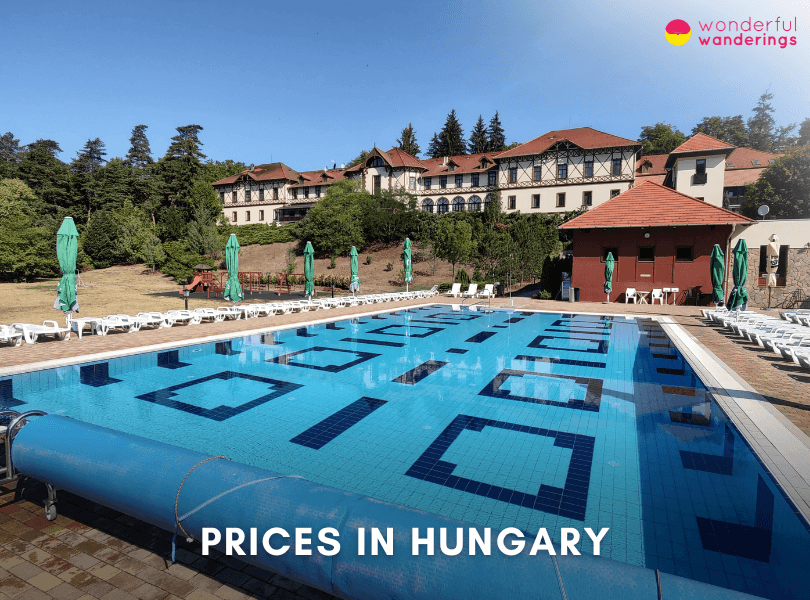Hungary, a country in Central Europe, offers a cost-effective destination for travelers and residents alike. It is relatively budget-friendly. Hungary’s cost of living is lower than many other European countries. The average daily expenses for a person in Hungary range from 35€ ($38.15, £30.45) to 50€ ($54.5, £43.5), depending on their lifestyle and location. Hungary provides various options catering to different budgets. In major cities like Budapest, a wide range of hotels, hostels and apartments are available at reasonable rates. A mid-range hotel room in Hungary can cost 70€ ($76.3, £60.9) to 100€ ($109, £87) per night, while budget-friendly accommodations such as hostels can be found for as low as 15€ ($16.35, £13.05) to 30€ ($32.7, £26.1) per night.
The prices of goods and services in Hungary vary depending on the location, quality and season. Some of the main factors that affect the prices are the currency exchange rate, the inflation rate, the taxes and the supply and demand. The prices are higher in the urban areas, especially in Budapest than in the rural areas. The prices are also higher during the peak tourist seasons, such as summer and winter holidays than in the off-season.
Why is Hungary considered expensive?
Hungary is considered expensive because of its high cost of living, taxes, tourism industry, strong currency and resource costs. Firstly, one of the main reasons why Hungary is considered expensive is the high cost of utilities, such as electricity, gas, water and internet. According to a report by Eurostat, Hungary has the second-highest electricity prices and the fourth-highest gas prices in the European Union. It means many people must spend much of their income on heating, cooling and lighting their homes. Internet access is also pricey in Hungary, with an average monthly cost of 23€ ($25.07, £20.01), which is higher than the EU average of 21€ ($22.89, £18.27). Secondly, another factor that makes Hungary expensive is the difficulty of learning Hungarian, which is one of the most complex languages in the world for non-native speakers. Hungarian has a unique grammar system, a large vocabulary and many exceptions and irregularities. It makes it hard for foreigners to communicate, work and study in Hungary and often requires them to pay for language courses, translators or interpreters.
Most Hungarians do not speak English or other foreign languages well, which limits their opportunities to interact with tourists, ex-pats and international businesses. Thirdly, a third cause of Hungary’s high cost of living is the low salaries, especially for unskilled or low-skilled workers. The average monthly net salary in Hungary is 670€ ($730.3, £582.9), which is much lower than the EU average of 1550€ ($1689.5, £1348.5). It means that many people struggle to afford necessities, such as food, clothing and healthcare, let alone save money or enjoy leisure activities. The minimum wage in Hungary is 464€ ($505.76, £403.68), which is barely enough to cover the rent and utilities for a small apartment in Budapest. Fourthly, the other reason Hungary is expensive is the high demand and low housing supply, especially in urban areas such as Budapest.
Budapest is Hungary’s capital and largest city and the one of the most popular places to visit in Hungary for tourists, students and ex-pats. There is not enough housing to accommodate the growing population, which drives up rent and property prices. The average monthly rent for a one-bedroom apartment in Budapest is 400€ ($436, £348), more than half the average salary. Buying a house or a flat in Budapest can cost up to 2500€ ($2725, £2175) per square meter, which is more than double the national average of 1,100 € ($1,260, £920). Lastly, the other factor contributing to Hungary’s high cost of living is its location and geography. Hungary is landlocked, meaning it does not have access to the sea or ocean. It limits trade and transportation options and makes it dependent on neighboring countries for imports and exports. As a result, Hungary has to pay higher prices for many goods and services, such as fuel, food and travel. Hungary has a continental climate with hot summers and cold winters. It requires people to use more energy for heating and cooling, affecting the availability and quality of agricultural products.
How much is the fare when traveling by Train to Hungary?
The fare when traveling by Train to Hungary depends on the departure point, the route, the type of train and the booking time. A one-way ticket from London to Budapest costs 139 € ($152, £117) if booked two months in advance, but 139€ ($151.51, £120.93) if booked one week before departure. The train fare to Hungary is relatively high because of the lack of high-speed rail connections between Hungary and other European countries. Hungary has only one high-speed line connecting Budapest with Vienna in Austria. Most international trains to and from Hungary are conventional or regional trains with lower speeds and longer travel times. The journey from Paris to Budapest takes 14 hours by train but only 2 hours by plane. The other reason the train fare to Hungary is relatively high is the high demand and low supply of train tickets, especially during peak seasons or holidays. Hungary is a popular destination for tourists, students and ex-pats who want to explore its rich history, culture and natural scenery. There is not enough capacity to accommodate the growing number of train travelers, which drives up the prices of train tickets. Some train routes to Hungary have limited frequency or availability, which reduces the options and flexibility for train travelers.
How is Traveling by Train Compared to Plane When Visiting Hungary?
Traveling by plane offers speed and convenience for international travel to Hungary, while trains provide a scenic and relaxed experience. Plane travel is faster, particularly for long distances, while trains offer a more budget-friendly option for shorter journeys. Firstly, traveling by plane is generally faster and more convenient for long distances. International flights can quickly transport travelers to Hungary from various destinations worldwide. A flight from London to Budapest takes 2 to 3 hours, while a train journey can take 22 hours. The speed of air travel saves time, making it a preferred choice for those seeking efficiency. Secondly, trains provide a scenic and relaxed travel experience within Hungary. Train journeys allow passengers to enjoy the countryside views and engage in the local landscapes. It can be particularly appealing for travelers who appreciate a leisurely travel pace and wish to explore the beauty of the Hungarian countryside. Trains often offer more legroom and comfort than airplanes, making the journey more comfortable, especially for longer trips. Thirdly, train travel in Hungary can be more cost-effective than flying, particularly for shorter distances. Train tickets within the country are cheaper than airfare and various fare options are often available to suit different budgets. Trains often offer more flexibility regarding departure times and frequent connections between cities, providing travelers with more options and convenience. Lastly, trains can directly connect city centers, while airports are usually outside major cities. This means that train stations are often more accessible and located in central areas, making it easier for travelers to reach their final destinations. Airports, on the other hand, may require additional transportation or transfers, which can add to the overall travel time and cost.
How Much Does a Plane Ticket Cost for Hungary?
The plane ticket cost for Hungary can range from 100€ ($109, £87) to 300€ ($327, £261). Firstly, the distance between the departure location and Hungary plays a significant role in ticket prices. Flights from neighboring European countries or destinations closer to Hungary are cheaper than long-haul international flights. A flight from Vienna, Austria, to Budapest, Hungary, can cost 100€ ($109, £87) to 150€ ($163.5, £130.5) for an economy class ticket. Secondly, the time of booking can impact the cost of plane tickets. Booking in advance, preferably several months ahead, can help secure lower prices. Last-minute bookings or peak travel times, such as holidays or weekends, often increase ticket prices due to increased demand. Lastly, the airline and class of service chosen also influence the ticket price. Different airlines have their pricing strategies and service levels, with some offering more affordable options while others providing premium services at higher costs. Economy class tickets are typically more budget-friendly than business or first-class tickets.
What should you Consider when Going Around Hungary?
Listed below are the things that visitors should consider when going around Hungary.
- Public Transportation. Visitors should consider utilizing Hungary’s efficient public transportation system, which includes buses, trams and metros. These modes of transport are cost-effective and provide convenient access to various attractions and cities within the country.
- Language. Though Hungarian is the official language, English is widely spoken in tourist areas and major cities, but visitors should still be prepared for occasional language barriers and consider carrying a translation app or phrasebook to facilitate communication.
- Currency. Hungary’s official currency is the Hungarian Forint (HUF). Visitors should know the current exchange rate and consider using local currency for small purchases, as not all establishments may accept credit cards or foreign currencies.
- Weather. Hungary experiences distinct seasons, with hot summers and cold winters. Visitors should consider the weather conditions during their travel dates and pack accordingly. It is advisable to check the forecast and dress in layers to accommodate temperature variations throughout the day.
- Cultural Etiquette. Respecting local customs and traditions is important when visiting Hungary. Visitors should familiarize themselves with basic etiquette, such as greeting people with a handshake or a nod and being mindful of dress codes when visiting religious sites. It is customary to tip 10% in restaurants and cafes for good service.
How Much Does the Average Taxi Fare Cost?
The average taxi fare in Hungary can range from 1€ ($1.09, £0.87) to 5€ ($5.45, £4.35). The taxi ride’s starting fare in Budapest is typically 1.5€ ($1.64, £1.31) to 2.5€ ($2.73, £2.18). This starting fare includes an initial distance of a few kilometers. Additional charges are then applied per kilometer, ranging from 0.8€ ($0.87, £0.7) to 1€ ($1.09, £0.87). A 10-kilometer (6.2 miles) taxi ride in Budapest could cost 10€ ($10.9, £8.7) to 13€ ($14.17, £11.31). In other cities of Hungary, such as Debrecen or Szeged, taxi fares tend to be slightly lower than in Budapest. The starting fares can range from 0.9€ ($0.98, £0.78) to 1.5€ ($1.64, £1.31), with additional charges per kilometer varying from 0.6€ ($0.65, £0.52) to 0.9€ ($0.98, £0.78). It is important to note that taxi fares may also include additional charges for waiting time, luggage or night rides. Visitors are advised to check the rates displayed in the taxi or communicate with the driver to clarify the expected fare before starting the journey.
How Much Does the Average Bus Fare Cost?
The average bus fare in Hungary can range from 1€ ($1.09, £0.87) to 2€ ($2.18, £1.74). In Budapest, the average bus fare for a single ride is typically 1.5€ ($1.64, £1.31) to 1.2€ ($1.31, £1.04). This fare allows passengers to travel within the city’s extensive public transportation network, including buses, trams and metros, for a certain duration or distance. Bus fares in other cities across Hungary are similar or slightly lower than in Budapest. The average fare for a single bus ride in cities such as Debrecen or Szeged ranges from 0.9€ ($0.98, £0.78) to 1.2€ ($1.31, £1.04). It is important to note that some cities offer discounted fares for students, seniors and other eligible groups. Multi-ride tickets or passes are available, which can provide further savings for frequent bus travelers.
Is Traveling with Bus Around Hungary Worth It?
Yes, traveling by bus around Hungary is worth it. Firstly, buses in Hungary provide an extensive and well-connected transportation network that allows travelers to reach various destinations efficiently. Whether exploring Budapest’s streets or venturing into other cities and towns, buses offer a reliable mode of transportation. They operate regularly, ensuring travelers can conveniently plan their itineraries and navigate the country. Secondly, bus travel in Hungary is affordable, making it a cost-effective option for budget-conscious travelers. The average bus fares are reasonably priced and often discounted fares are available for students, seniors and other eligible groups. This affordability allows travelers to explore different parts of Hungary without breaking the bank, making it a worthwhile choice for those seeking economical travel options. Lastly, bus travel allows visitors to experience the local culture and interact with fellow passengers. It provides an opportunity to observe everyday life in Hungary and engage in the local atmosphere and with the locals. This aspect of bus travel can enhance the overall experience by offering insights into the country’s people, customs and way of life.
How Much Does the Average Car Rental Cost in Hungary?
The average car rental cost in Hungary starts from 20€ ($21.8, £17.4) to 50€ ($54.5, £43.5). This price may include standard insurance coverage and unlimited mileage for a certain duration. Additional fees for extras such as GPS navigation systems, child seats or additional drivers may apply. For larger vehicles or luxury cars, the rental prices can be higher, ranging from 50€ ($54.5, £43.5) to 150€ ($163.5, £130.5) per day, depending on the specific model and rental company. It is also worth noting that the rental cost can vary depending on the location. In major cities like Budapest, car rental prices might be slightly higher compared to smaller towns or less touristy areas. Renting a car in Hungary is a good ideal if you want to save money on transportation.
How Much Would You Be Paying for the Fuel of the Rental Car?
Visitors would be paying between 40€ ($43.6, £34.8) to 50€ ($54.5, £43.5) for the fuel of the rental car in Hungary. When renting a car, visitors must usually return the vehicle with the same fuel level as when they picked it up. In some cases, the rental company may offer the option to prepay for a full fuel tank at a discounted rate, allowing visitors to return the car with an empty tank. This can be convenient for travelers who prefer not to worry about refueling before returning the vehicle. It is essential to consider the terms and conditions of such offers, as they may include additional fees or restrictions. Visitors should factor in their estimated fuel consumption, the distance they plan to travel and the prevailing fuel prices to determine the approximate amount they would be paying for fuel during their rental period.
Are fuel prices expensive in Hungary?
Yes, fuel prices are expensive in Hungary. Firstly, compared to other European countries, Hungary has higher fuel prices. The average price of gasoline in Hungary is 1.5€ ($1.64, £1.31) per liter, while diesel prices are slightly lower, at 1.4€ ($1.53, £1.22) per liter. These prices can be higher compared to neighboring countries such as Slovakia, where fuel prices are generally lower. Secondly, the higher fuel prices in Hungary can be attributed to various factors. The main factor is the high taxation imposed on fuel. The Hungarian government levies significant excise taxes and value-added tax (VAT) on fuel, directly contributing to the overall price. These taxes are implemented to generate revenue for the government and fund various public services and infrastructure projects. Lastly, Hungary heavily relies on imported fuel, contributing to higher prices. The country’s domestic oil production is limited and it needs to import a significant portion of its fuel requirements from other countries. Importing fuel often involves transportation and logistical costs, which add to the pump’s overall fuel price.
Are basic food products expensive in Hungary?
No, basic food products are not expensive in Hungary. Firstly, compared to other European countries, the cost of basic food items in Hungary is relatively lower. The prices of staple foods such as bread, milk, eggs and vegetables are generally reasonable and affordable for most people. Secondly, Hungary has strong agricultural sector contributes to the availability and affordability of basic food products. The country has fertile agricultural land and a favorable climate for farming, allowing for producing a wide range of food items domestically. Lastly, the competitive nature of the Hungarian food market also plays a role in maintaining affordable prices. There are various supermarkets, grocery stores and local markets where consumers can find competitively priced food products.
What is the cost of dinner for two in a restaurant in Budapest and Hungary?
The cost of dinner for two in a restaurant in Budapest and Hungary can range between 20€ ($21.8, £17.4) and 150€ ($163.5, £130.5). In an average mid-range restaurant, the cost of two dinners, including main courses and non-alcoholic beverages, can range between 20€ ($21.8, £17.4) and 40€ ($43.6, £34.8). This price range ensures customers enjoy a satisfying meal without breaking the bank. If dining in a more upscale or high-end restaurant, the cost of two dinners can be higher. In such establishments, where the ambiance, service and culinary experience are elevated, the cost can range from 40€ ($43.6, £34.8) to 80€ ($87.2, £69.6). These restaurants often offer a more refined dining experience, with a wider selection of gourmet dishes and premium ingredients.
What is the average cost of a hotel room in Hungary?
The average cost of a hotel room in Hungary can range from 50€ ($54.5, £43.5) to 150€ ($163.5, £130.5). The location plays a significant role. In major cities and popular tourist destinations like Budapest, the demand for hotel rooms is high, especially during peak travel seasons. The type and quality of the hotel also affect the cost. Hungary offers a range of accommodation options, including budget hotels, mid-range hotels and luxury hotels. Budget hotels typically offer more affordable rates, while luxury hotels with higher-end amenities and services command higher prices. The specific facilities, such as spa services, fitness centers and on-site restaurants, can also influence the cost. The time of year can impact hotel prices in Hungary. The peak tourist season, which generally falls during the summer months, tends to have higher rates due to increased demand, while traveling during the off-peak season, such as winter, can often result in lower hotel prices and potential discounts.
Is public transport expensive in Hungary?
No, public transport is not expensive in Hungary. Hungary’s public transportation cost is relatively low compared to many other European countries. The prices for tickets and passes are designed to be accessible to the general population, making public transport an affordable option for daily commuting and travel within the country. A single ticket for a local transport ride in Hungary typically costs 1.5€ ($1.64, £1.31), depending on the city and the distance traveled. Hungary has implemented various ticketing systems, including single-use tickets, daily passes and monthly or annual passes, which offer cost-effective options for regular commuters. These ticketing options provide flexibility and convenience for individuals to choose the most suitable fare for their needs. Discounted fares are often available for certain demographic groups, such as students, seniors and people with disabilities, further enhancing the affordability of public transport.
Is petrol expensive in Hungary?
Yes, petrol is expensive in Hungary. the average petrol price in Hungary is 1.5€ ($1.64, £1.31). Taxes and excise duties imposed on fuel contribute significantly to the overall cost. These taxes are implemented by the government to generate revenue and promote environmental sustainability by discouraging excessive fuel consumption. Hungary relies on imported oil, which can also impact the price of petrol as it is subject to global supply and demand dynamics. Environmental regulations and standards set by the European Union also influence the cost of petrol in Hungary. These regulations aim to reduce emissions and promote cleaner fuels and technologies, which can lead to higher production costs and, consequently, higher prices at the pump.
What is the cost of a bus or metro ticket in Hungary?
The cost of a bus or metro ticket in Hungary can range from 0.97€ ($1.06, £0.84) for single tickers, while a monthly ticket valid for all means of public transportation costs 26.36€ ($28.73, £22.93). The government strives to maintain accessible public transportation systems by implementing reasonable fares. This ensures that individuals from various socioeconomic backgrounds can afford to use public transport as a reliable mode of travel. The integration of different modes of public transport, such as buses, trams and metros, allows passengers to enjoy seamless transfers and efficient connections, further enhancing the value of the ticket. The availability of various ticketing options, such as daily passes, weekly passes and monthly passes, provides cost-effective choices for regular commuters and frequent travelers. These options allow passengers to save money by purchasing tickets that suit their travel needs, whether for a single day or an extended period. Discounted fares are often available for specific demographic groups, such as students, seniors and people with disabilities, making public transport even more affordable and inclusive.
Are taxis expensive in Hungary?
No, taxis are not expensive in Hungary. The average taxi fare in Hungary can range from 1€ ($1.09, £0.87) to 5€ ($5.45, £4.35). The taxi ride’s starting fare in Budapest is typically 1.5€ ($1.64, £1.31) to 2.5€ ($2.73, £2.18). This starting fare includes an initial distance of a few kilometers. Additional charges are then applied per kilometer, ranging from 0.8€ ($0.87, £0.7) to 1€ ($1.09, £0.87). A 10-kilometer (6.2 miles) taxi ride in Budapest could cost 10€ ($10.9, £8.7) to 13€ ($14.17, £11.31). In other cities of Hungary, such as Debrecen or Szeged, taxi fares tend to be slightly lower than in Budapest. The starting fares can range from 0.9€ ($0.98, £0.78) to 1.5€ ($1.64, £1.31), with additional charges per kilometer varying from 0.6€ ($0.65, £0.52) to 0.9€ ($0.98, £0.78).
What is the average salary per month in Hungary?
The average salary per month in Hungary is 670€ ($730.3, £582.9). The average salary in Hungary depends on several factors, such as experience, education, profession and city. The more experienced, educated and skilled a Hungarian employee is, the more they earn. The minimum wage in Hungary is 464€ ($505.76, £403.68).
What is the price of basic food in Hungary?
Find below the typical prices of basic foods in Hungary.
- Milk: A Gallon of Mil costs $4.29
- Bread: 1 lb of Bread costs $1.45
- Rice: 1 lb of Rice costs $0.88
- Eggs: A pack of 12 eggs cost $2.84
- Chicken Breast: 1 lb of Chicken Breast cost $2.56
- Apples: 1 lb of Apples cost $1.61
- Oranges: 1 lb of Oranges cost $1.43
What is the price of tobacco in Hungary?
The average price for a pack of 20 Marlboro cigarettes in Budapest (Hungary) is $5.84 . This is similar to prices in Spain and Slovakia.
Listed below are the cigarette prices in Budapest and Hungary:
- Malboro: A pack of 20 Marlboro cigarettes cost is $5.84.
- Chesterfield Blue: A pack of Chesterfield Blue is around 2,000 HUF or $5.70 USD
Cigarettes prices in Hungary in general are expected to increase by $0.50 per pack, meaning a pack would cost $6.24 . Cigarette prices are quite similar across cities in Hungary, with Budapest on the higher end and smaller towns may be up to 10% cheaper. The tobacco prices found for Budapest likely reflect a typical range for most of the country. Hungary levies both specific and ad valorem excise taxes on cigarettes, along with a 27% VAT. Total taxes account for the large majority of cigarette prices paid by consumers.
Visitors to Hungary can purchase tax free cigarettes at the duty free shops located at the airport, within the standard allowances permitted for personal use. Purchases may need to be declared and some duties paid if the limits are exceeded. The duty free allowance for bringing cigarettes into Hungary is generally 200 cigarettes for travelers over age 17 arriving by air from non-EU countries, while in EU countries, the typical allowance is 800 cigarettes.
What is the prices of alcohol in Hungary?
Alcohol prices in Hungary are the lowest in the EU, with price levels 27% below average. This includes wine, beer and spirits. The favorable prices make Budapest one of the cheapest cities in Europe for alcohol and drinking.
Find below the alcohol prices in Hungary.
Vodka & Spirits: The average price for a 0.5 liter bottle of vodka in Hungary is $4.60. Prices have remained quite steady in recent years.
Wine: A glass of wine in Budapest (Hungary) costs between $0.55 and $0.84. Wine prices are very affordable compared to other European countries
Beer: A pint of lager beer averages between $0.40 and $0.64 in Budapest which is considered very affordable.
Alcohol prices in Hungary and Budapest remain very affordable by EU standards, especially for local wine and beer. It stands out as one of the cheapest countries for alcohol purchases.
There are some localized time restrictions on retail alcohol sales, plus public drinking bans and standard laws against sales to minors and intoxicated persons. The legal drinking age is 18 in Hungary. This applies to purchasing all alcoholic drinks including beer, wine, and spirits. Some districts in Budapest have regulations banning the sale of alcohol in grocery and convenience stores between 10pm-6am. This is a local law that varies between districts. It’s illegal to sell alcohol near schools, kindergartens and churches in Hungary. Carrying open containers of alcohol and drinking while driving is illegal as hungary has strict drunk driving laws.
Where would you eat in Hungary if you wanted to Save Money?
Visitors can eat in street food stands, self-service restaurants, local markets, étkezde and supermarkets. Firstly, street food stands offer a budget-friendly dining experience in Hungary. These stands are scattered throughout cities like Budapest and offer various tasty and inexpensive options. From lángos, a deep-fried dough topped with various toppings, to chimney cake, a sweet pastry coated in sugar, visitors can enjoy the flavors of Hungary at affordable prices. Street food stands typically offer meals for 3€ ($3.27, £2.61) to 5€ ($5.45, £4.35). Secondly, self-service restaurants are another great option for budget-conscious visitors. These establishments allow visitors to serve themselves various dishes, paying only for their choices. Self-service restaurants are popular in Hungary and offer a range of traditional Hungarian dishes like goulash, paprika chicken and stuffed cabbage. Meals at self-service restaurants typically cost 5€ ($5.45, £4.35) to 7€ ($7.63, £6.09). Thirdly, local markets in Hungary provide an opportunity to taste authentic Hungarian cuisine at affordable prices. These markets, such as the Great Market Hall in Budapest, offer fresh produce, meats and traditional Hungarian snacks. Visitors can explore the market, purchase ingredients and create budget-friendly meals. Most markets have food stalls where visitors can sample local dishes like lángos or sausage. Prices at local markets vary depending on the items purchased, but visitors can find affordable options starting from 2€ ($2.18, £1.74) to 3€ ($3.27, £2.61). Fourthly, small family-owned eateries called “étkezde” are known for their reasonably priced home-cooked meals. These establishments serve traditional Hungarian dishes in a cozy and casual atmosphere. Visitors can enjoy hearty dishes like chicken paprikash, Hungarian-style stews and potato casseroles. Meals at étkezde typically range from 6€ ($6.54, £5.22) to 10€ ($10.9, £8.7), making them an excellent choice for budget-conscious travelers. Lastly, supermarkets and grocery stores offer a wide range of affordable Hungarian food options. Visitors can purchase bread, cheese, cold cuts and other meal ingredients. Supermarkets often have a section dedicated to ready-to-eat meals, sandwiches and salads at lower prices than restaurants. Visitors can save even more money on their dining expenses by opting for supermarket purchases.
What are the most expensive restaurants in Hungary?
Listed below are the most expensive restaurants in Hungary.
- Costes Restaurant. Costes Restaurant is a Michelin-starred restaurant in Budapest that offers a fine dining experience with a friendly atmosphere. The menu features modern and creative dishes inspired by Hungarian and international cuisine. Some signature dishes are the foie gras with black caviar, the sturgeon fish soup and the Esterházy cake. The tasting menu costs 180€ ($196.2, £156.6) per person or 250€ ($272.5, £217.5) with wine pairing.
- Nobu Étterem. Nobu Étterem is the Budapest branch of the famous Japanese restaurant chain inside the Paris Hotel. The restaurant serves exquisite sushi, sashimi and innovative dishes that combine Japanese and Peruvian flavors. Some highlights are the black cod with miso, the yellowtail jalapeño and the chocolate bento box. The average price for a meal is 100€ ($109, £87) per person, excluding drinks.
- IKON Restaurant. IKON Restaurant is a fine dining restaurant in Debrecen, the second-largest city in Hungary. The restaurant offers a seasonal and contemporary menu using local and organic ingredients. Some dishes are the duck breast with beetroot, the lamb loin with mint and the chocolate cake with raspberry. The tasting menu costs 75€ ($81.75, £65.25) per person or 105€ ($114.45, £91.35) with wine pairing.
- Malomudvar Étterem. Malomudvar Étterem is a traditional Hungarian restaurant in Debrecen, located in a former mill. The restaurant serves hearty and authentic dishes, such as goulash, stuffed cabbage and chicken paprikash. The portions are generous and the prices are reasonable, considering the quality and the service. The average price for a meal is 40€ ($43.6, £34.8) per person, including drinks.
- Roosevelt Étterem. Roosevelt Étterem is a fine dining restaurant in Szeged, the third-largest city in Hungary. The restaurant is located in a historic building overlooking the Tisza River. The menu features elegant and refined dishes, such as foie gras terrine, lobster bisque and beef tenderloin. The tasting menu costs 90€ ($98.1, £78.3) per person or 130€ ($141.7, £113.1) with wine pairing.
Where to have cheap drinks in Hungary but still enjoy them?
There are 5 main destinations to have cheap drinks in Hungary, but still enjoy them. Firstly, Budapest, the capital city of Hungary, offers several options for enjoying cheap drinks without compromising on the experience. Ruin bars are a popular choice among locals and tourists alike. These unique bars are located in abandoned buildings and courtyards, creating an unconventional atmosphere. Szimpla Kert is one of Budapest’s most famous ruin bars, where visitors can savor reasonably priced drinks in a bohemian setting. A pint of beer costs 2.5€ ($2.73, £2.18), providing an affordable way to have a good time. Secondly, Debrecen, the second-largest city in Hungary, is another great destination for those seeking cheap drinks and a pleasant ambiance. The city is home to numerous pubs and bars that offer wallet-friendly prices. Kis Piros is a popular Debrecen pub known for its lively atmosphere and affordable drinks. Visitors can enjoy a glass of wine for 3€ ($3.27, £2.61) or a cocktail for 5€ ($5.45, £4.35). Thirdly, Szeged, located in southern Hungary, is known for its nightlife and affordable drinking options. The city has many bars and pubs where visitors can indulge in inexpensive drinks. Korhely Étkezde & Kocsma is a popular spot in Szeged, offering a cozy atmosphere and affordable prices. A glass of local beer costs 2€ ($2.18, £1.74), allowing visitors to enjoy a refreshing drink without breaking the bank. Fourthly, Pécs, a city in southwestern Hungary, is known for its rich history and cultural scene. It also offers opportunities to enjoy affordable drinks in a pleasant setting. The city center has cozy pubs and bars catering to various tastes and budgets. Korhely Falatozó és Borozó is a popular spot in Pécs, offering a wide selection of drinks at reasonable prices. Visitors can enjoy a glass of wine for 3€ ($3.27, £2.61) or a pint of beer for 2€ ($2.18, £1.74). Lastly, Győr, a city in northwestern Hungary, is another destination where visitors can find cheap drinks without compromising the experience. The city’s bar scene offers plenty of options for budget-conscious travelers. The Beer Bank is a popular pub in Győr, offering a wide range of beers at affordable prices. A pint of beer costs 2.5€ ($2.73, £2.18), allowing visitors to enjoy a refreshing drink without straining their wallets.
What are the best bars in Hungary?
Listed below are the best bars in Hungary.
- High Note SkyBar. High Note SkyBar is a rooftop terrace and bar next to the Basilica. It offers breathtaking views and service, cocktails, lunch and dinner. The bar is open all year round and has a seasonal menu and theme. The average price of a cocktail is 12€ ($13.08, £10.44).
- 360 Bar. 360 Bar is another rooftop bar on Andrássy Avenue. It has a 360-degree panorama of the city and features heated ‘igloos’ in winter. The bar serves drinks, snacks and brunch and hosts live music and DJs. The average drink price is 6€ ($6.54, £5.22).
- KOLLÁZS – Brasserie & Bar. KOLLÁZS is a contemporary European brasserie and bar in the Four Seasons Hotel, overlooking the Chain Bridge and the Danube River. It has a stylish and elegant interior and serves classic and creative dishes and drinks. The bar has a large selection of wines, spirits and cocktails and also offers afternoon tea and live jazz. The average price of a cocktail is 15€ ($16.35, £13.05).
- Spíler. Spíler is a modern and trendy bar and restaurant in the Gozsdu Courtyard, a popular nightlife area. It has a lively and friendly atmosphere and serves Hungarian and international food and drinks. The bar has a variety of beers, wines and cocktails and features live music and sports screenings. The average drink price is 4€ ($4.36, £3.48).
- Tukory Kert. Tukory Kert is a traditional pub in the Castle District, a historic and scenic part of the city. It has a cozy and rustic interior and a large outdoor terrace. The pub serves local and craft beers, wines and spirits and offers snacks and sandwiches. The average drink price is 3€ ($3.27, £2.61).
What are the things to Do in Hungary?
Listed below are the things to do in Hungary.
- Visit Budapest. Hungary’s capital city offers many attractions, including the historic Buda Castle, the majestic Hungarian Parliament Building and the Széchenyi Thermal Bath. Budapest’s lively atmosphere, streets and views from the Fisherman’s Bastion make it a must-visit destination.
- Explore Lake Balaton. Lake Balaton is the largest freshwater lake in Central Europe. It offers swimming, sailing and sunbathing opportunities along its shores. Visitors can also explore lakeside towns like Siófok and Tihany or indulge in the region’s famous wines.
- Discover the Danube Bend. The Danube Bend is a scenic area in northern Hungary where the Danube River flows through the Visegrád Hills. Visitors can enjoy panoramic views from the hilltop Visegrád Castle, explore the town of Szentendre with its art galleries and museums or take a leisurely boat cruise along the river.
- Visit the Tokaj Wine Region. Tokaj is a famous wine region in northeastern Hungary, known for its sweet dessert wines. Wine lovers can explore vineyards, enjoy wine tastings and learn about the centuries-old winemaking traditions. The region’s beautiful landscapes and villages add to the beauty of the experience.
- Explore the Puszta. The Puszta, also known as the Great Hungarian Plain, offers a unique cultural and natural experience. Visitors can witness traditional Hungarian horsemanship at the Hortobágy National Park, ride in horse-drawn carriages and attend folk music and dance performances. The vast open landscapes of the Puszta showcase the beauty of Hungary’s rural heritage.
How can you lower your expenses in Hungary?
There are 3 ways for visitors to lower their expenses in Hungary. Firstly, when it comes to accommodation, visitors can save money by choosing budget-friendly options. There are a variety of guesthouses, hostels and budget hotels available in major cities like Budapest. These establishments offer comfortable and clean accommodations at more affordable rates compared to upscale hotels. Visitors can also consider booking their stay during off-peak seasons with lower prices. Secondly, visitors can lower expenses by exploring affordable dining options in Hungary. Though traditional Hungarian restaurants offer delicious local cuisine, they may be more expensive. Visitors can try local street food vendors, market halls and self-service buffet-style restaurants known as “étkezde”. These places offer authentic Hungarian dishes at reasonable prices, allowing visitors to experience the local gastronomy without breaking the bank. Purchasing groceries from supermarkets or local markets and preparing meals can also be cost-effective. Lastly, taking advantage of the public transportation system can significantly reduce expenses in Hungary. Cities like Budapest have an extensive network of trams, buses and metro lines that offer affordable and convenient transportation options. Visitors can purchase a travel pass, such as a Budapest Card, which provides unlimited access to public transportation and discounts to various attractions. The use of public transportation not only saves money but also allows visitors to explore the city efficiently.
Why would you consider visiting Hungary during low season?
Visitors should consider visiting Hungary during the low season because they can enjoy a more relaxed and cost-effective experience. Firstly, visiting Hungary during the low season means encountering fewer crowds and shorter queues at popular attractions. Tourist hotspots like Budapest’s iconic Parliament Building, Buda Castle and thermal baths can get crowded during peak travel. During the low season, visitors can enjoy a more relaxed and uncrowded experience, allowing them to explore these attractions at their own pace and without the hassle of long queues. Secondly, visiting during the low season can significantly save accommodation and travel costs. Hotels and guesthouses offer lower rates during this period, making it more budget-friendly for visitors. Flight tickets and other transportation options may also be more affordable, allowing visitors to maximize their travel budget. Restaurants and shops may offer discounts and special deals during the low season to attract customers, further enhancing the cost-saving benefits. Lastly, visiting Hungary during the low season allows one to experience the country’s more authentic and peaceful side. Visitors can engage in the local culture, interact with locals and enjoy a more genuine experience. They can explore neighborhoods and hidden gems that are less crowded and truly get a sense of the local way of life.
Why book your ticket ahead when planning to visit Hungary?
Visitors should book their tickets ahead when planning to visit Hungary because they can secure their preferred travel dates and times, take advantage of better deals and avoid the inconvenience of sold-out transportation options. Firstly, booking tickets ahead allows travelers to secure their preferred travel dates and times. Visitors can choose the most convenient and suitable options for their trip by planning. This is especially important during peak travel seasons when demand for flights and train tickets is high. Secondly, booking tickets ahead often leads to better deals and discounts. Most airlines and train companies offer discounted fares for early bookings, allowing travelers to save on transportation expenses. These savings can be significant, especially for long-haul flights or train journeys. Lastly, booking tickets ahead helps travelers avoid the inconvenience of sold-out or fully booked transportation options. Hungary is a popular tourist destination and certain routes or flights can fill up quickly, especially during peak travel periods or holidays. Visitors can secure their seats by booking in advance and avoid the stress of last-minute scrambling for alternative travel arrangements. This ensures a smoother and more hassle-free travel experience.
Why you should be careful with alcohol in Hungary?
Visitors should be careful with alcohol in Hungary for 3 main reasons. Firstly, visitors should be careful with alcohol in Hungary to avoid the risks of overindulgence. Hungarian alcoholic beverages, such as pálinka (fruit brandy) and Unicum (herbal liqueur), can be strong and have a higher alcohol content compared to what visitors may be accustomed to in their home countries. Consuming excessive amounts of alcohol can lead to impaired judgment, health issues and potentially dangerous situations. Visitors must drink responsibly, set personal limits and be mindful of alcohol intake to ensure their well-being and safety. Secondly, visitors should be aware of the differences in alcohol content and cultural norms in Hungary. The alcohol content of Hungarian drinks may vary and it is important to be mindful of this when consuming them. Visitors should familiarize themselves with the alcohol content of different beverages and drink in moderation. Hungary’s cultural norms and drinking customs may differ from other countries. Understanding and respecting these cultural differences can help visitors avoid misunderstandings and ensure their behavior remains appropriate and respectful while enjoying alcoholic beverages. Lastly, responsible behavior is paramount when consuming alcohol in Hungary. Visitors should prioritize their safety and the well-being of others. This includes not drinking and driving, as Hungary has strict laws and penalties for driving under the influence. Visitors are encouraged to use alternative means of transportation or designated drivers when alcohol is involved. Being respectful and considerate towards locals and fellow tourists is essential. Maintaining control, acting responsibly and avoiding excessive public intoxication is important for a positive and enjoyable experience in Hungary.
Is Hungary Expensive?
No, Hungary is not expensive compared to Western European cities. The cost of living in Hungary is relatively lower than in many Western capitals, making it an attractive choice for budget-conscious travelers. Basic goods such as milk, cigarettes, bottled water and beer are priced 3€ ($3.27, £2.61) to 5€ ($5.45, £4.35), with local products often offering good value for money. Breakfast at local eateries or cafes is also affordable, making dining out an accessible option for visitors. The cost of traveling within Hungary, including public transportation and taxis, is also relatively economical, further enhancing its affordability. Hungary is known for its reasonable accommodation prices, with various options to suit different budgets. For those looking to enjoy a pint of beer, the cost is 5€ ($5.45, £4.35) to 15€ ($16.35, £13.05), with Hungary offering competitive prices compared to many other European cities.
Is Hungary Worth the Visit?
Yes, Hungary is worth the visit. Firstly, it offers a rich and diverse cultural heritage, blending historical sites, architectural wonders and traditions. Visitors can explore magnificent landmarks like the Buda Castle, Matthias Church and the iconic Parliament Building. The country’s thermal baths, such as the Széchenyi and Gellért Baths, provide a unique and relaxing experience. Hungary’s cultural festivals, including the Budapest Spring and Sziget festivals, showcase the nation’s artistic and musical talents. Secondly, Hungary’s gastronomy is a treat for food lovers. Hungarian cuisine is known for its hearty and flavorful dishes, such as goulash, chimney cake (kürtőskalács) and langos. Visitors can indulge in traditional restaurants or explore local markets and street food vendors to savor the authentic flavors of Hungarian cuisine. Wine lovers will also appreciate Hungary’s wine regions, like Tokaj and Eger, which produce high-quality wines. Lastly, Hungary offers affordability compared to many other European destinations. Visitors can enjoy a range of accommodations, from budget-friendly options to luxurious hotels, at reasonable prices. Dining out, transportation and entertainment also offer good value for money. Hungary’s favorable exchange rates make it an attractive destination for travelers seeking an enriching experience without straining their budget.
What is the most expensive city in Hungary?
The most expensive city in Hungary is Budapest. Budapest is the capital city and the country’s economic hub, attracting businesses, professionals and tourists. The demand for housing, goods and services in a bustling metropolis like Budapest drives up prices. Accommodation costs, in particular, are higher than in other cities in Hungary, with various options available, from luxury hotels to upscale apartments. Budapest offers various entertainment, dining and cultural experiences, contributing to its higher cost. The city boasts a vibrant nightlife, with numerous bars, clubs and restaurants catering to different tastes and preferences. Dining out in popular areas or trying international cuisines can be relatively expensive. Budapest is known for its rich cultural scene, with various theaters, museums and galleries. Entry fees for these attractions and the cost of concerts and performances can add to the overall expenses.
PIN FOR LATER
Find below our best travel guides about Hungary.









